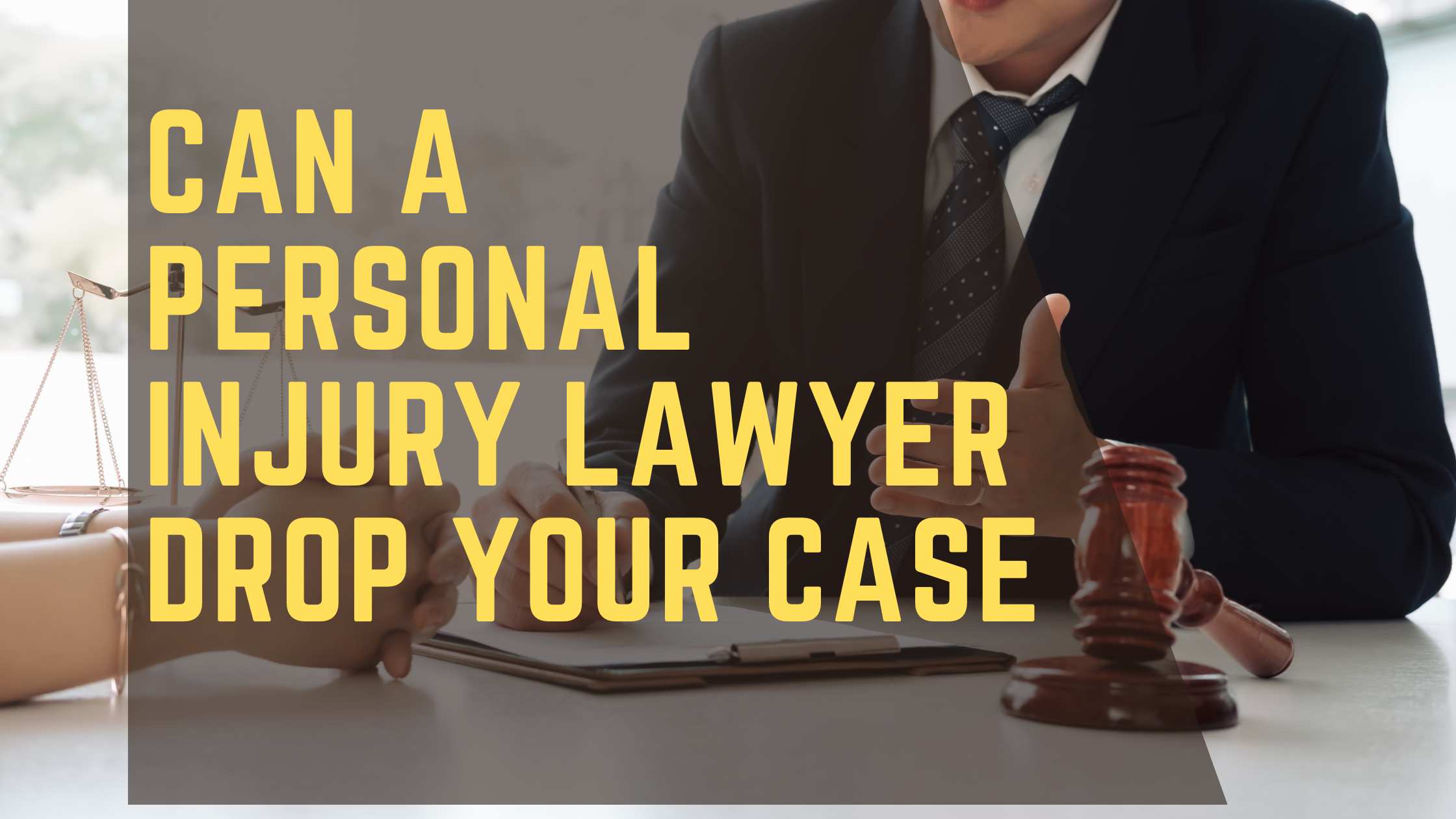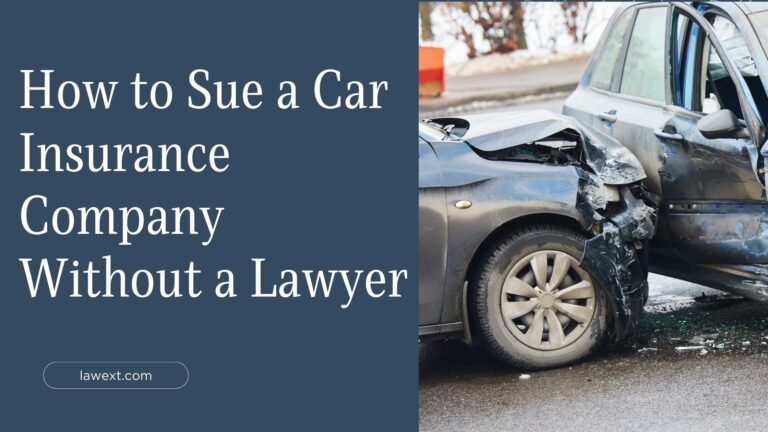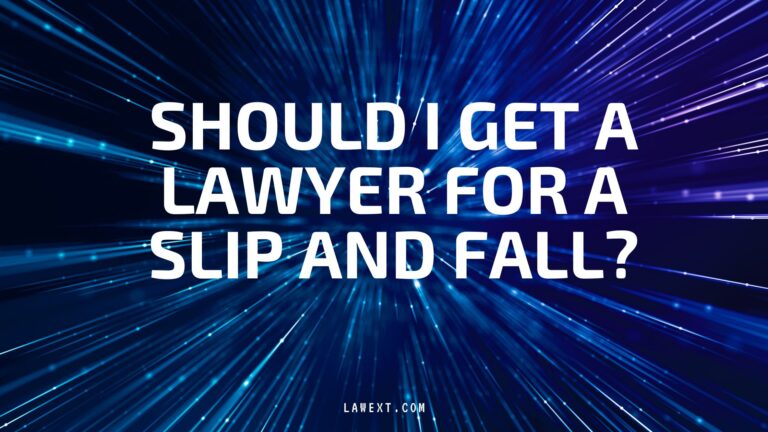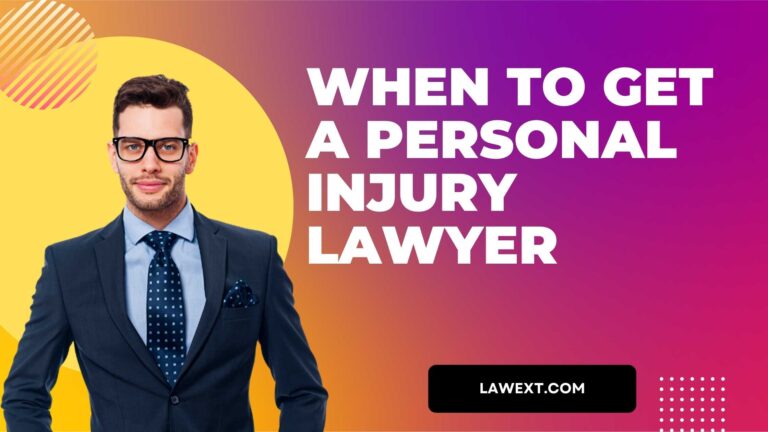Can a Personal Injury Lawyer Drop Your Case?

Yes, a personal injury lawyer has the right to drop your case. Now, I will provide a well-rounded introduction to the topic of personal injury lawyers and the circumstances in which they may choose to drop a case.
Facing an unfortunate personal injury due to someone else’s negligence can be a distressing experience. During this challenging time, finding a skilled personal injury lawyer to represent your case becomes crucial. However, it is important to understand that there may be instances where a lawyer could drop your case.
Can a Personal Injury Lawyer Drop Your Case? Personal injury lawyers typically work on a contingency fee basis, meaning they only receive payment if they win the case. Various factors can lead to a lawyer dropping a case, such as insufficient evidence, conflicts of interest, or a breakdown in client-lawyer communication. We will explore the circumstances in which a personal injury lawyer might choose to withdraw from your case and what steps you can take if this occurs.
Reasons Personal Injury Lawyers May Drop A Case
When you hire a personal injury lawyer, you expect them to fight for your rights and represent your best interests. However, there are instances when a lawyer may decide to drop your case. Understanding the reasons why this might happen can help you prepare for any potential challenges along the way.
Client Misrepresentation
One of the primary reasons why a personal injury lawyer may drop a case is if they discover the client has misrepresented the facts or withheld important information. This can undermine the attorney’s ability to effectively represent the client’s interests and can also negatively impact their professional reputation.
Lack Of Sufficient Evidence
In order to build a strong personal injury case, sufficient evidence is crucial. If a lawyer determines that there is a lack of compelling evidence to support the client’s claim, they may choose to drop the case. Without substantial evidence, the chances of successfully achieving a favorable outcome are significantly reduced.
Conflicts Of Interest
Conflicts of interest can arise in various ways, leading a personal injury lawyer to drop a case. For example, the lawyer may have recently discovered that they have a previous connection or professional relationship with the opposing party or their legal representation. In such situations, continuing to represent the client would compromise the lawyer’s ethical duties and professional obligations.
The Process Of A Personal Injury Case
A personal injury case involves a series of steps from the initial consultation to litigation and trial. Understanding the process can help you navigate the complexities of seeking legal redress for your injuries. Each phase requires careful attention to detail, and a skilled personal injury lawyer can guide you through the intricacies of your case.
Initial Consultation
The initial consultation is the first step in the process of seeking legal help for a personal injury case. During this meeting, you will have the opportunity to discuss the details of your case with a personal injury lawyer. This is your chance to share your side of the story, including the circumstances surrounding the injury and the parties involved. The lawyer will evaluate the merits of your case and provide you with an overview of the legal process.
Investigation And Gathering Evidence
After the initial consultation, the lawyer will commence an investigation to gather relevant evidence. This may involve obtaining medical records, interviewing witnesses, and collecting any documentation that supports your claim. Thorough investigation and evidence gathering are crucial to building a strong case and establishing the liability of the responsible party.
Negotiation And Settlement
If the evidence supports your claim, the lawyer will enter into negotiations with the opposing party or their insurance company. The goal is to reach a fair settlement that compensates you for your injuries and other losses. Your lawyer will advocate on your behalf to ensure that the settlement amount reflects the full extent of your damages.
Filing A Lawsuit
If a fair settlement cannot be reached, your lawyer may advise filing a lawsuit to pursue legal action in the court. This formal legal action initiates the litigation process and sets the stage for a trial to resolve the dispute. Filing a lawsuit demonstrates your willingness to seek a resolution through legal channels and may prompt the opposing party to reconsider their position.
Litigation And Trial
The litigation and trial phase involves presenting your case before a judge and jury. Your lawyer will argue your case, present evidence, and cross-examine witnesses during the trial. Litigation and trial are complex processes that require skill and experience to navigate effectively. Your lawyer will work diligently to present a compelling case and advocate for the best possible outcome on your behalf.
When A Personal Injury Lawyer Decides To Drop A Case
Personal injury cases can be complex and time-consuming, requiring a significant investment of an attorney’s resources. However, there are situations where a personal injury lawyer may decide to drop a case due to various reasons. Understanding why a lawyer would drop a case can help shed light on the potential challenges faced by both the lawyer and the client.
Violation Of Attorney-client Relationship
The attorney-client relationship is built on trust and confidentiality. When a client violates this relationship, it may become untenable for the lawyer to continue representing them. This can occur if the client deliberately withholds important information, lies about the details of the case, or engages in inappropriate behavior towards the lawyer or their staff. In such cases, the lawyer may choose to drop the case to protect their professional reputation and ensure ethical conduct.
Lack Of Cooperation From The Client
A successful personal injury case relies on the close collaboration between the lawyer and the client. If the client fails to provide timely and accurate information, does not attend scheduled appointments, or does not follow the lawyer’s advice, it can severely impact the progress of the case. Lawyers need the client’s full cooperation to build a strong case and negotiate with insurance companies or opposing parties. If the lack of cooperation persists despite the lawyer’s efforts, they may decide to drop the case to focus their resources on more viable ones.
Ethical Concerns
Lawyers have a duty to uphold ethical standards in their practice. If they discover that a client’s claim is fraudulent or involves illegal activities, they may have no choice but to drop the case. Engaging in unethical conduct can jeopardize a lawyer’s license to practice law and tarnish their professional reputation. Additionally, if the lawyer becomes aware of a conflict of interest that prevents them from providing unbiased representation, they may need to withdraw from the case to preserve the integrity of the legal system.
Client’s Inability To Pay Fees
Legal representation comes at a cost, and personal injury cases can require extensive financial resources. If a client is unable to pay the required fees or expenses associated with the case and fails to make alternative payment arrangements, the lawyer may decide to drop the case. Lawyers have their own financial obligations and must ensure they can sustain their practice while effectively serving their clients. In such situations, the lawyer may advise the client to find alternative legal representation or explore other options for pursuing their claim.
What To Do If Your Lawyer Wants To Drop Your Personal Injury Case
Personal injury cases can be complex and time-consuming, requiring the expertise of a skilled personal injury lawyer. However, there may be circumstances where your lawyer wants to drop your case. This can be a frustrating and confusing situation, but it’s important to understand your options and take the necessary steps. In this article, we will discuss what you should do if your lawyer wants to drop your personal injury case.
Communication And Discussion
Effective communication is crucial when your lawyer expresses their desire to drop your case. Initiating an open and honest discussion can help you understand the reasons behind their decision and explore potential solutions. It’s important to stay calm and ask for specific details on why they want to drop the case. By having a clear understanding of their concerns or any limitations, you can then assess if there are ways to address those issues or if it’s necessary to seek alternative legal representation.
Seeking A Second Opinion
When faced with the possibility of your lawyer dropping your case, it may be beneficial to seek a second opinion. Consulting with another personal injury lawyer can provide you with a fresh perspective and ensure you make informed decisions. During the consultation, be transparent about the current state of your case and the reasons your current lawyer wants to drop it. This will enable the new lawyer to evaluate the circumstances and provide an objective assessment of your options moving forward.
Understanding Your Options
It’s essential to understand the potential options available to you if your lawyer decides to drop your personal injury case. These options can vary based on the specifics of your situation, such as the stage of the case and the reasons behind the lawyer’s decision. Some possible alternatives may include:
- Seeking a replacement lawyer who is willing to take on your case.
- Exploring alternative dispute resolution methods, such as mediation or arbitration, to avoid litigation.
- Ensuring you have all the necessary documentation and evidence to pursue the case on your own.
- Evaluating if it’s in your best interest to settle the case outside of court.
By understanding these options, you can make an informed decision about the best course of action for your personal injury case.
Dealing with your lawyer wanting to drop your personal injury case can be disheartening. However, by engaging in open communication and seeking a second opinion, you can explore alternatives and make the best decision for your situation. Understanding your options and taking appropriate steps will allow you to navigate this challenging situation with confidence.
Preventing Your Personal Injury Lawyer From Dropping Your Case
Clear and effective communication is the key to a successful attorney-client relationship. It’s imperative to maintain open and honest communication with your personal injury lawyer throughout the duration of your case. Keep your lawyer informed about any developments or changes that may affect your case.
Cooperating fully with the lawyer includes providing all necessary information, responding promptly to requests, and attending all scheduled meetings. Your active involvement in the legal process is crucial – it demonstrates your commitment to your case and facilitates a smoother, more efficient resolution.
Trust and confidence in your lawyer’s expertise are essential. Following the lawyer’s advice demonstrates your willingness to consider their professional recommendations and expertise, ultimately contributing to the success of your case. Your lawyer’s advice is tailored to your specific circumstances and is intended to maximize your chances of a favorable outcome.
Adhering to the financial aspects of the lawyer-client relationship is fundamental. Paying fees as agreed ensures that your lawyer can dedicate the necessary time and resources to your case, without any unnecessary distractions. A transparent and fair fee structure allows a lawyer to focus solely on achieving the best possible results for you.

Credit: www.msllegal.com
Conclusion
A personal injury lawyer can drop your case under certain circumstances. Understanding the reasons behind such actions can help you navigate potential hurdles. It’s crucial to maintain open communication with your lawyer and stay informed about the progress of your case to avoid any surprises.
This can help ensure a smoother legal process and protect your rights.
Introducing Jonah Plum, a legal luminary whose journey through the corridors of justice has been intertwined with the eloquence of the written word. Born and raised in the vibrant city of Seattle, Washington, Jonah's early fascination with language and debate laid the foundation for a remarkable career in law.
Jonah's scholarly odyssey began at Harvard Law School, where they immersed themselves in the study of jurisprudence, honing their analytical prowess and legal acumen. Armed with a law degree, they entered the legal arena, navigating courtrooms and boardrooms with a fervor for justice. Yet, it was the realization of the transformative power of the written word that led Jonah to pivot from legal briefs to the world of blogging.
A digital advocate in the truest sense, Jonah recognized the need for demystifying legal concepts and making them accessible to a broader audience. This blog, a virtual repository of legal insights, transcends geographical boundaries, connecting with a global readership hungry for clarity amidst legal complexities.
Beyond the black letter of the law, Jonah delves into the human stories that underscore the legal landscape. Their writing goes beyond legal analysis, weaving narratives that humanize the law, shedding light on its impact on individuals and society.






